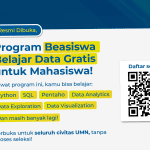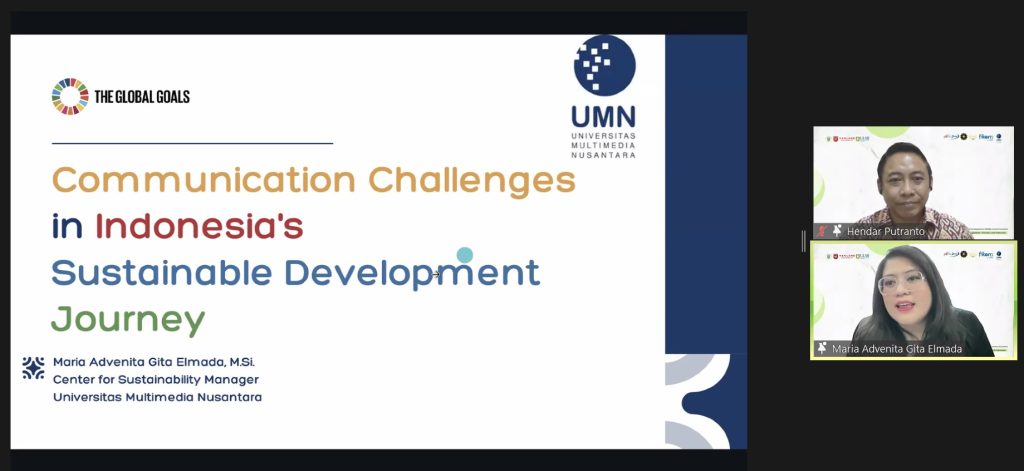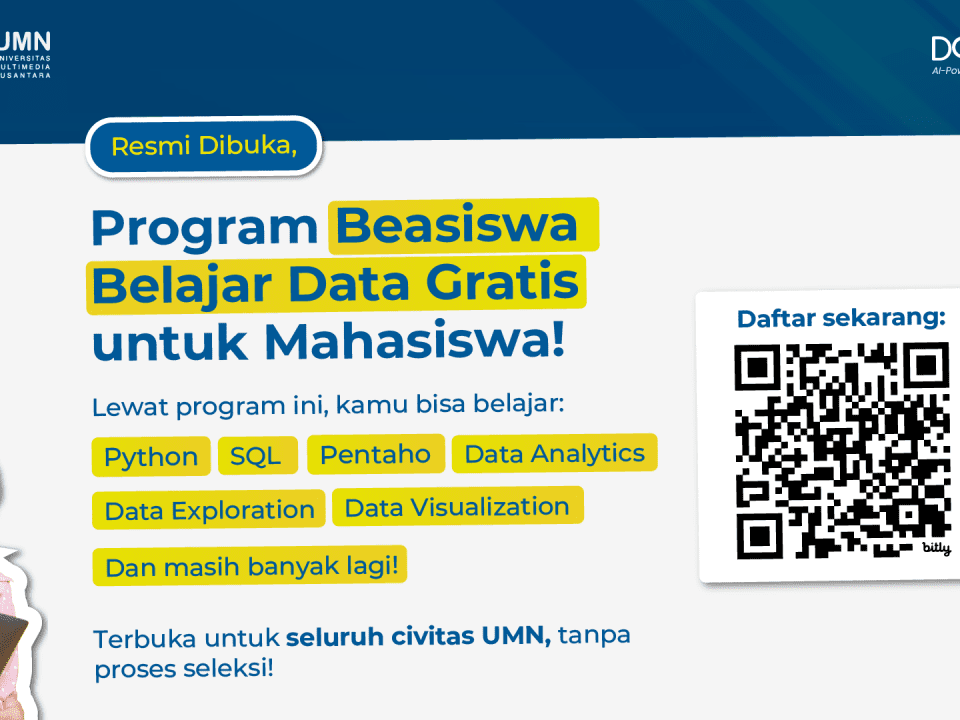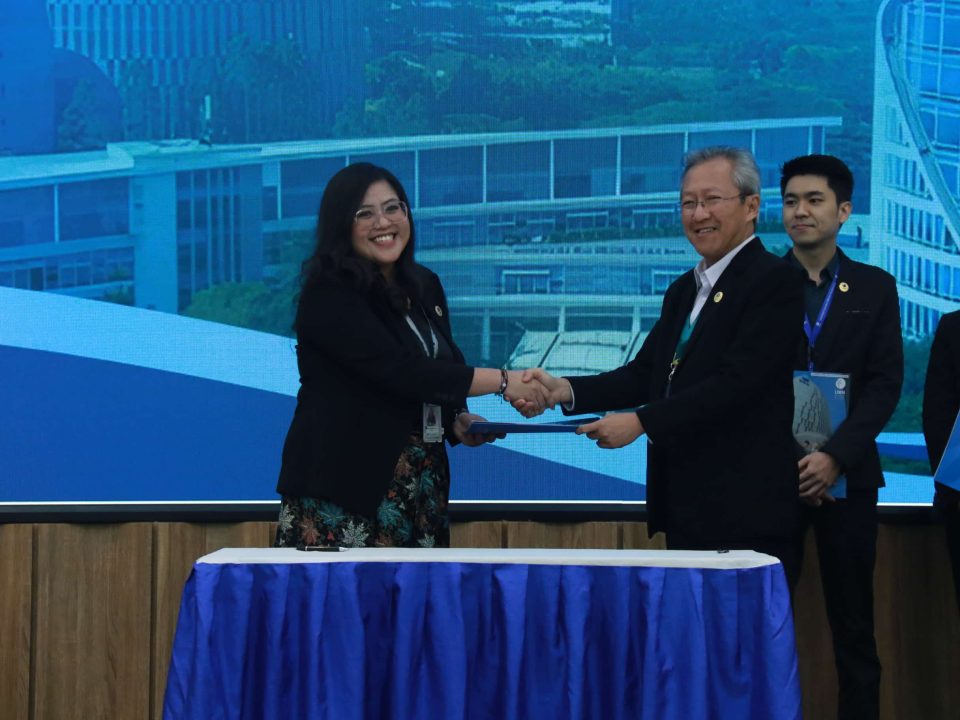
Prospective UMN Students, Here are Various Majors for You to Have a Career in Data
April 3, 2025
Seminar tentang program keberlanjutan di Indonesia (Doc. UMN)
TANGERANG – On Wednesday (19/03/25), the Communications Faculty of Universitas Multimedia Nusantara (UMN) hosted a virtual discussion themed “The Challenge of Communication for Sustainable Development in Middle-income Countries.” The discussion discussed the efforts and challenges of communicating sustainable development in the four Southeast Asian countries: the Philippines, Bangladesh, Vietnam, and Indonesia.
The discussion is organized by UMN, the University of St. Thomas (UST) Angelicum College, Manila, Philippines, and the University of Liberal Arts Bangladesh (ULAB). Representatives from each university are invited as speakers. They are Prof. Eunice Mareth Q. Areola, PhD HSG from the UST and Angelicum College; Prof. Jude William Genilo from the ULAB; Huynh Tan Loi, Ph. D., from the Faculty of Environment at Van Lang University; and Ms. Maria Advenita Gita Elmada, M. Si., from the Faculty of Communication Science, UMN, Indonesia.
“This is a forum discussion dedicated to fostering international dialogue on one of the most pressing issues of our time. We will learn how the nations navigate unique paths toward sustainable growth while confronting certain challenges. The speakers’ insight will illuminate how communication can empower societies to balance economic progress, environmental resilience, and social equity,” Dr. Rismi Juliadi, S.T., M.Si, the UMN Dean of Faculty Communication, said, opening the discussion.
Sustainability: A Multifaceted and Complex Topic
Each speaker presented their insight on the challenge of communication for sustainable development. Starting the discussion, Eunice mentioned that sustainability is multifaceted as it has a lot of technical jargon. It is difficult to understand, and not everybody knows about sustainability. In addition, there are a lot of misconceptions about sustainability.
“Many people think it’s just about the environment and the planet; there is a lot of doubt. Of course, some of the communication tools that came up mostly addressed covering up the faults of the corporation, and we call that greenwashing,” Eunice explained.
She emphasized that, ultimately, it is all about communicating and doing sustainability properly to improve lives and allow us to understand inclusive organizations. We must ensure that our minds, hearts, and hands go together for ethics and responsibility. Sustainability must be communicated as something true for all ages.
“I’d like to give you an analogy. Our native food, sapin-sapin, and your native food, kue lapis, look the same and taste the same, but how we offer them will spell the difference between being challenged in communicating about sustainability and being able to reach out and make sure that the whole idea of sustainability and sustainable development goals becomes acceptable and part of the mainstream,” Eunice explained.
A Call for The 18th SDGs: Communication
In the case of Bangladesh, Jude explained that she started by sharing how communication is central to the SDGs but is omitted. The World Association of Christian Communicators has moved this forward. With the Global Alliance for Public Relations and Communication Management, has been telling the United Nations (UN) that SDG 18 should be about communication.
“During the pandemic, humanity survived because of communication. So why was the SDG goal so silent about communication? People in media and communication are wondering why the UN didn’t think about this?” Jude said.
Jude then proceeded to share the challenges of sharing information about sustainable development. These include the digital divide, misinformation, language barriers, inclusivity, freedom of expression, and engaging marginalized communities.
In addition, she shared the solutions provided by her university to help deal with these issues. Some strategies are community-based approaches, leveraging the digital divide in social media, mutual literacy, responsible communication, and policy support.
Incorporating Sustainability in Higher Education Curriculum
Tan Loi then continued the presentation. She shared the contribution of Van Lang University and how they brought the concept of sustainability to the community and students. Various efforts were made to improve students’ and staff’s physical and mental health, reduce social inequality, improve the quality of education, ensure equal rights in learning and research, water and energy efficiency, responsibility in human consumption, achieve net zero emission target by 2045, and strengthening the governance and corporate in sustainable development.
Regarding the challenges, Tan Loi shared that the university plays a significant role in advancing sustainability. However, there is still a lack of integration into the curriculum, changing habits and practices, student and faculty engagement in the sustainable goals, student awareness, and a clear and consistent message.
Localizing The Context of SDG in an Archipelagic Country
As the last speaker, Maria shared the efforts and challenges of UMN and Indonesia to achieve the SDGs. She shared that UMN itself is trying to integrate and centralize sustainability efforts more to achieve sustainability targets sooner than it’s supposed to.
Per the challenges, Maria shared that, like Bangladesh, Indonesia has approximately 280 million people spread across more than 17.000 islands with more than 700 languages, as it is an archipelagic country.
This leads to several challenges, such as education inequality, economic disparities, disaster threats, localizing the context of sustainability, etc., making achieving the SDGs harder. In addition, misinformation, media literacy, and distrust of the government and corporate initiatives (greenwashing and whitewashing) are big problems.
“In the 2024 Sustainable Development report, we are ranked 78 out of 166 countries. It is neither good nor bad, considering Indonesia’s unique demographic, environmental, socio-economic, and cultural condition; making all sustainability efforts must be more integrated, contextualized, and localized,” Maria shared.
She also compared Indonesia’s situation to Vietnam’s. Vietnam has achieved two greens, meaning it achieved the SDGs for the two goals. Indonesia doesn’t have any greens in the dashboard. Although Indonesia is performing better and is on track to achieve the 2030 goals, this is not sufficient, with many goals stagnating and not moving.
In addition, sustainability is becoming a buzzword in Indonesia. The government, corporations, and universities always talk about sustainability. However, the talks about sustainability are merely discussions that don’t touch the essence of sustainability.
UMN’s Effort in Achieving Sustainability
Maria shared that sustainability efforts in universities should be different and advanced. Universities can create knowledge through research on how integrating sustainability in our everyday life to assess the sustainability effort and issues around us.
UMN has achieved and integrated SDGs in its curriculum by adjusting and creating the courses and using sustainability as case studies in class. UMN also push sustainability-related projects in research and community service and outreach. In addition, UMN is one of the most sustainable campus in the Greater Jakarta Area, ranking the 128th most green university in the world in 2024.
“In our day-to-day operation, we do a lot of environmental efforts like our green building, recycling water, and encouraging students to care about sustainability,” Maria said, ending her speech.
Together, We Can Achieve The Sustainable Development Goals
In conclusion, the four countries experience similar challenges and efforts. By addressing environmental degradation, climate change vulnerability, social inequality, and the need for education and innovation, these nations can work towards communicating the issues more inclusively, reaching out to larger audiences, and shaping a more sustainable future.
Collaborative initiatives that engage all stakeholders will be essential in overcoming these challenges and achieving sustainable development goals. Effective and inclusive communication is a fundamental pillar for achieving sustainable development in the Philippines, Bangladesh, Vietnam, and Indonesia. These nations can pave the way for a more sustainable and equitable future by addressing communication challenges and implementing inclusive and collaborative strategies.
By Levina Chrestella Theodora
English translation by Levina Chrestella Theodora
Kuliah di Jakarta untuk jurusan program studi Informatika| Sistem Informasi | Teknik Komputer | Teknik Elektro | Teknik Fisika | Akuntansi | Manajemen| Komunikasi Strategis | Jurnalistik | Desain Komunikasi Visual | Film dan Animasi | Arsitektur | D3 Perhotelan , di Universitas Multimedia Nusantara.





